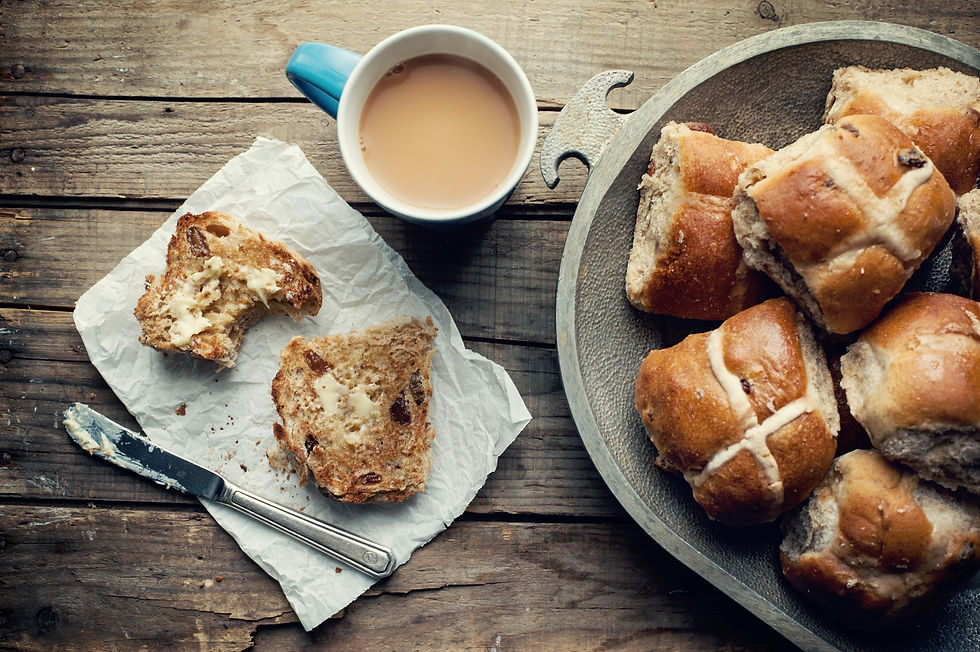What to eat during Easter
- Anasztázia
- Mar 28, 2023
- 3 min read
Updated: Apr 17, 2023
Easter is a time of religious and cultural significance, and the food that is typically eaten during this holiday can vary depending on the region and customs. Many people enjoy traditional dishes such as ham, lamb, hot cross buns, and Easter eggs. These foods are often associated with the themes of rebirth and renewal. In this blog article, we'll explore some traditional food and drink.
Discover with us:
🍽 Ham
🍽 Lamb
🍽 Cheese
🍽 Pastry
🍽 Wine
Hot Cross Buns
Hot Cross Buns are a traditional Easter food that originated in the United Kingdom. These spiced buns are made with raisins or currants and are marked with a cross on top. The cross symbolises the crucifixion of Jesus, making them a popular food during the Christian holiday. Hot Cross Buns are often enjoyed as a breakfast or brunch food, toasted and served with butter. In some cultures, it is believed that Hot Cross Buns have magical properties, such as the ability to ward off evil spirits and prevent fires in the home.
Ham
A glazed ham is often the centrepiece of the Easter dinner table. It is typically baked and coated with a mixture of brown sugar, honey, and spices for a sweet and savoury flavour. Some families choose to serve their ham with pineapple, cherries, or other fruit toppings. Leftover ham can be used to make sandwiches or added to omelettes or quiches for breakfast.
Lamb
Lamb is a popular food to serve during Easter in many cultures, as it symbolises sacrifice and resurrection. It is often served as the main course for Easter dinner. Roasted lamb is a traditional preparation, but it can also be grilled, stewed, or braised. Herbs such as rosemary, thyme, and mint are often used to flavour lamb dishes.
Easter eggs and Easter bunny
Easter eggs and Easter bunnies are symbols of Easter, representing new life and rebirth. Eggs have been associated with spring and fertility for centuries, and painting eggs has been a traditional Easter activity in many cultures. In some countries, children participate in Easter egg hunts to find hidden eggs filled with candy or small toys. Easter bunnies, or rabbits, are also associated with fertility and reproduction, as they are known for their ability to produce many offspring. Chocolate Easter bunnies are a popular treat during Easter, with many different sizes and flavours available. In addition to chocolate bunnies, Easter eggs are also often made of chocolate, and can be filled with treats such as caramel or peanut butter.
Cheese
Cheese often as part of a cheese board or appetiser spread. A variety of cheeses can be included, such as cheddar, brie, blue cheese, and goat cheese. It can be paired with crackers, bread, and fruit for a delicious snack or appetiser. In some cultures, cheese is served as part of a traditional Easter dish, such as the Italian ricotta-filled Easter pie called pastiera.
Pastry
Pastry is a delicious addition to any Easter menu, with many different options to choose from. Some popular Easter pastries include hot cross buns, simnel cake, and Italian Easter bread. Simnel cake is a fruitcake made with marzipan, and is traditionally served during Easter in the United Kingdom. Italian Easter bread, or pane di Pasqua, is a sweet bread that is often shaped into a wreath or braid and decorated with colourful eggs. Pastry can also be used as a base for savoury Easter dishes, such as quiches or pies.
Wine
Wine is often enjoyed with the Easter meal. Some families may choose to serve white wine with ham or lamb, while others may prefer a red wine. Sparkling wine or champagne can also be a festive option to celebrate the holiday. In some cultures, such as in Italy, it is traditional to drink wine during the Easter Vigil mass. Wine can also be used as an ingredient in cooking, such as in a wine sauce for ham or as a flavouring for desserts such as wine-poached pears.
We are reaching the end of the blog and hope you enjoyed the reading. If you want to know more Europe food, culture and history check out the website. Don't forgot to read our previous blogs too "Best cities to celebrate Easter" and "Best Castles in Luxembourg"








Comments